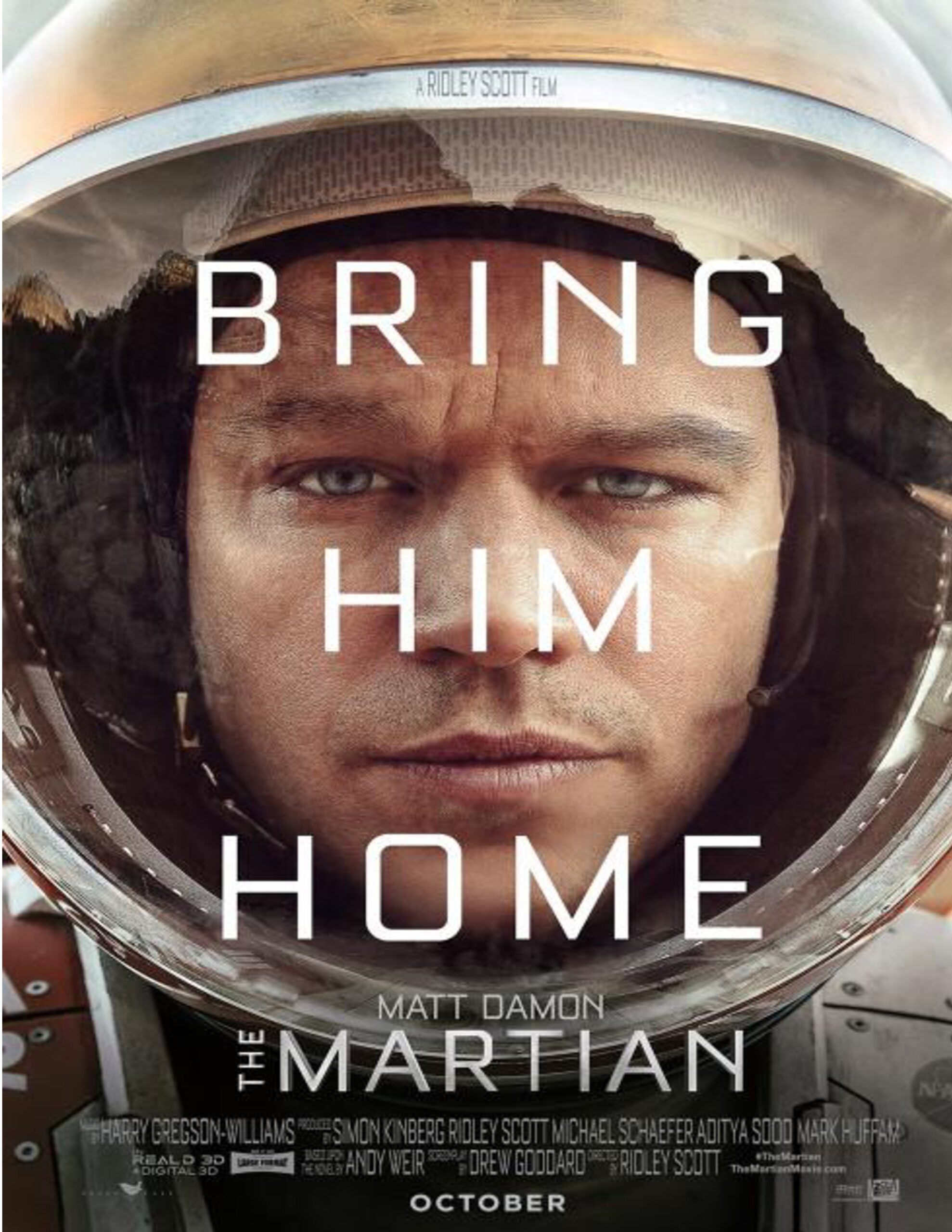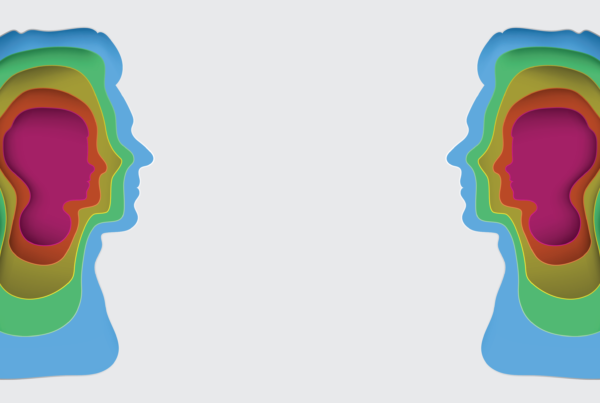Martian Coping Skills
For Humans Dealing with Stress, Trauma, and Depression
By Richard J. Loebl, LCSW, BCD
Spoiler Alert: This article will reveal some basic plot information about The Martian, a movie to be released in October, 2015. However, I promise not to spoil the ending, and I will only describe the coping skills used on Mars for dealing with trauma, stress and for dealing with depression.)
A couple months ago I finished reading The Martian, an exciting and fascinating novel written by Andy Weir, and published in 2014. I was thrilled to learn that a movie version of this book will be released this October. The movie, directed by Ridley Scott (Alien, Blade Runner, Thelma & Louise), has a cast that includes Matt Damon, Jessica Chastain, Kristin Wiig, Jeff Daniels, and Kate Mara.
The Martian is Mark Watney (Damon), an American astronaut stranded on Mars, who uses incredible coping skills for dealing with trauma, tremendous stress, and to avoid succumbing to hopelessness and depression. Self-help books and psychotherapists (like myself) could not do a better job of describing effective coping skills, stress management, surviving emotional trauma, and escaping the black hole of depression.
Years of psychological research and clinical observation have clarified several important coping skills for dealing with stress, emotional and physical trauma (including childhood abuse and abandonment). We have also learned a great deal about coping skills to manage, minimize or prevent depression. The Martian accurately depicts healthy coping skills for survival on Mars or on Earth – these strategies include:
o Positive attitude and beliefs – One of the most endearing and entertaining aspects of The Martian is Watney’s unwavering sense of humor and his positive, mostly optimistic attitude. Certainly not an easily available attribute if you’re stranded on Mars! The fictional Watney may have been blessed with a positive personality and a natural sense of humor. It’s also true that he consciously used that personal trait to stay alive. He did struggle at times with some feelings of hopelessness and depression. But he mostly approached his situation with an attitude of acceptance and a belief in possibilities. Almost all of us have some capacity for developing and maintaining a positive attitude during times of stress – even when we cope with trauma in our lives. Correcting negative and self-defeating beliefs are a key stress management strategy. Maintaining a realistic attitude of optimism, flexibility and adaptability can be practiced using mindfulness techniques (see Mindfulness, below).
o Meaning & Purpose – Watney knew that he needed to make sense of and understand a totally unique situation that no human had ever experienced before. He used an organized and rational thought process to gain clarity – so that he could cope with odds that seemed insurmountable. He was aware of his trauma-based emotional reactions – mostly fear, feelings of hopelessness, some depression and anger. But he would not succumb to those feelings. He used coping skills described so eloquently by Viktor Frankl in his book Man’s Search for Meaning, published in 1946. Frankl was a neurologist and psychiatrist who survived the Auschwitz concentration camp during World War II. Frankl found that we not only survive trauma and stress – we thrive and find meaning – by identifying our purpose in life and creating or own experience and outcomes. Watney challenged his negative thoughts and created adaptive beliefs about his abandonment on Mars. Then he identified his purpose – actually, several reasons for living, and specific goals and strategies to survive, and hopefully to return to Earth.
o Mindfulness – Andy Weir didn’t use this term in The Martian. However, he accurately described Watney’s use of mindfulness (simply, awareness without judgment). Watney used this coping skill for dealing with every aspect of his situation – surviving the trauma of isolation and a life threatening situation, and coping with relentless stress and periods of depression. His use of rational observation, objectivity, and emotional detachment helped him to regulate his internal experience (thoughts and feelings). Like all of us, there were times he felt hopeless, scared, sad and angry. But he found ways to diminish these feelings by using the power of his mind to find the solutions he needed to survive.
o Positive Action, Priorities & Solutions – When I was in my early 20’s, struggling at times with the demands of graduate school and a negative income, my father once told me that he fought off depression by staying busy and working. That worked for me! Taking positive action is one of the most important coping skills for dealing with stress and depression. Watney was all about that. He was determined to survive and return to Earth. With the mess he was left with on Mars (broken equipment and machines, inadequate supplies, and the ever present life threatening environment) he knew he had to establish priorities. Basic survival came first. Then he planned ahead to determine each sequential step he needed to find solutions to all of the problems and challenges ahead.
o Reaching Out For Support – One of the most important coping skills for surviving all types of trauma (e.g., war, serious accidents, life-threatening disease, bullying or assault), and for managing stress or depression. So how do you reach out for support when you’re all alone on another planet? I won’t spoil the fun by telling you how Watney managed this. However, it did become one of his highest priorities – certainly it was a survival strategy, but it’s quite clear he needed connection with other humans for emotional support. He had an emotionally-based need to know that there were people back on Earth who knew and understood his situation. Even though he was stranded on Mars he needed to know he wasn’t alone in the universe. All of us have that need, and reaching out for support is an essential coping strategy during difficult and challenging times.
o Journaling – Often recommended by counselors and therapists, journaling is an important coping skill for managing stress, anxiety and depression. Journaling helps us to clarify and understand our thoughts and feelings – even to find solutions to our problems and internal struggles. Watney made a journal entry almost every day on Mars. (I won’t tell you how he did that – I hope you read the book or see the movie.) Consciously, his reason for keeping a journal was to communicate his experience to other Earthlings (assuming they would find it someday). I believe he also kept a journal to help him stay alive, to cope with the trauma, and maybe to keep him sane.
o Self Care – Proper nutrition, adequate sleep and exercise are important coping skills. Recent studies show that people who get regular exercise tend to be less depressed – and when they are depressed they recover more quickly. Good nutrition and healthy sleep patterns are important tools for coping with stress. Dr. Bessel Van Der Kolk, a psychiatrist who specializes in the research and treatment of trauma, has found after years of studies that certain types of physical exercise (including yoga, tai chi, and even boxing) are very effective in the trauma recovery process. Self-care on Mars became a daily challenge for Watney. He knew right away that he must attend to his nutritional needs, and it wasn’t close to easy. There were times he knew he had to sleep, even when he was hungry and scared – and had far too many things to do to stay alive. So he slept. Exercise was almost impossible – but he had to stay active anyway, and the physical nature of his activity on Mars was certainly helpful.
o Diversions and Time-Outs – The final coping skill needed to deal with stress, anxiety and depression is the most enjoyable. Even on Mars, Mark Watney needed to take a time out from his efforts to survive –especially on such a lonely planet. His use of recorded music and old videos kept his spirits up and helped to distract him from his endless problems and challenges. It’s worth noting that we can also over-use or abuse these diversions. For example, video games and the internet can become a pattern of avoidance, even an addiction. Watney didn’t have to worry about that – he didn’t have enough reserve energy in his limited batteries!
The Martian is basically a survival story. Many, possibly most of us are survivors in our own right. We have survived the trauma of childhood abuse or abandonment, wars, death of loved ones, separation and divorce, business and financial loss, and other serious stress in our lives. Mark Watney’s ability to employ coping skills with ingenuity, rational planning, courage and his amazing sense of humor is a testament to the human spirit alive in all of us. I hope you’ve enjoyed reading this article as much as I enjoyed writing it. And I hope you enjoy reading or watching The Martian – a true celebration of human resilience.








